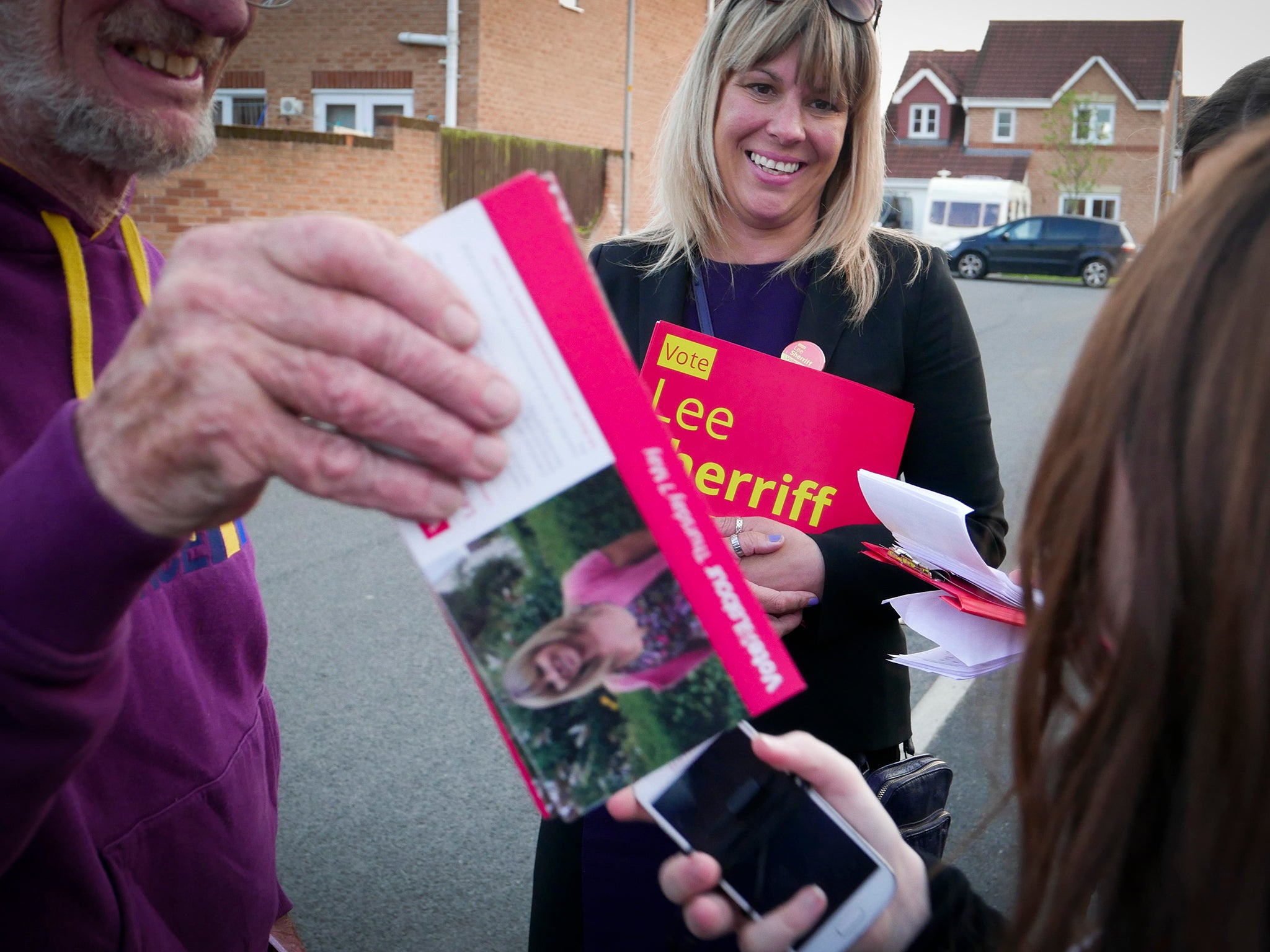Lee Sherriff: The Labour candidate trying to claw Carlisle back from the Tories
Here, just ten miles from the Scottish border, the Tories’ apocalyptic warnings about a Labour pact with the SNP are getting through

“You’re not Nicola Sturgeon are you?” asks Willie Richards, who was sitting in his front garden reading a newspaper until he was politely interrupted by Lee Sherriff, Labour’s candidate for Carlisle. “She’s a power crazy bloody woman and all,” he adds.
Sherriff is unfazed. “Stop believing Tory rhetoric,” she tells him sternly. But Mr Richards persists with his anti-SNP line of questioning. “What happens when you go hand-in-hand with them? That’d be horrendous, wouldn’t it?”
When The Independent last visited this marginal seat a year ago, this kind of doorstep conversation would have been unimaginable. The Scottish referendum had not yet happened and Alex Salmond was still the leader of the SNP. Now, it is Ms Sturgeon and her party’s potential deal with Labour at Westminster that is on the minds of voters.
On the face of it, this seems like bad news for Labour, which held Carlisle at every general election since 1964 but lost it to the Conservatives by just 853 votes in 2010. It shows that here, just ten miles from the Scottish border, the Tories’ apocalyptic warnings about a Labour pact with the SNP are getting through.
Are you undecided about who to vote for on 7 May? Are you confused about what the parties stand for and what they are offering? Take this interactive quiz to help you decide who to vote for...
That is certainly the view of John Stevenson, the incumbent MP, who is quietly confident of holding onto his seat. “Locally, it’s definitely becoming more of an issue. People are becoming more and more aware of it as the campaign has progressed, since Nicola Sturgeon had her leadership debates, which were impressive whatever your politics,” he said.
But there is a silver lining for Labour. A year ago, people in Carlisle who said they supported the party admitted they had serious concerns about Mr Miliband, describing him as “smarmy”, “like a car salesman” and “not dynamic”. But after the televised election debates, that is no longer the prevailing view.
In pictures: Experts' predictions for the General Election - 26/04/15
Show all 10Bob Gregory, 58, a semi-retired teacher and Labour voter, said Mr Miliband was “certainly” more electable than he used to be and had “grown into the role really well”. He added: “I think he’s totally changed. He seems much more in control, in charge, there’s more authority in what he’s saying.”
Others agreed. “He’s getting a bit of a backbone. Prior to that he seemed to want to appeal to everyone, and you just can’t do that,” said one voter. “When he gets going he does alright. I think he’s doing a good job. I trust him, I wouldn’t trust anybody else,” added another.
A poll by the Tory peer Lord Ashcroft conducted in August last year made cheering reading for Labour, as it gave Sherriff an 11 per cent lead over Mr Stevenson. But that, of course, was before the Scottish referendum and the SNP’s subsequent surge in popularity.
Sherriff, a mental health support worker who was raised in Carlisle and sells herself to voters on the doorstep as a local “Harraby lass”, said it was true that some were now expressing fears about the rise of the SNP, but usually changed their minds when she reminded them about the other issues facing the country.
“It’s not the SNP who’ve caused the problems at the hospital, it’s not the SNP who’ve caused the problems in England with people’s cost of living, it’s not the SNP who’ve caused the massive rise in food banks – it’s the Tories,” she said.
People in the city are “still not feeling the recovery” and are worried about the cost of living and the management of the local hospital, she added. “The biggest challenge is apathy, people saying ‘You’re all the same’. I just tell them if you want to see change, I’m the one that’s different. I’m a working class mum of three who was brought up in Carlisle, who understands what it’s like.”
While Sherriff says she is proud to be recognised on the streets as she canvasses for votes and describes travelling to Westminster as “an occupational hazard”, Stevenson admits that he is “not a natural extrovert” and that the locals’ recognition of him has been a “slow burn”. But he hopes people will credit him for the gradually improving local economy.
“On the doorstep, people are more aware that things have improved since 2010,” he said. “Carlisle’s a changing city, it’s growing, it’s developing, there’s more investment going in, and politically it’s changing as well.”
Canvassing returns suggest that the race for Carlisle will be just as close as it was five years ago. The direction the city swings on 7 May could depend on which party disaffected Liberal Democrat voters decide to back. Stevenson hopes the Coalition’s economic record will persuade them to vote for him, while Sherriff hopes they will stay true to their ideals and switch to Labour.
Back in Mr Richards' front garden, Sherriff appears to have won the battle, successfully persuading him to put aside his fears of the SNP and vote Labour. “You’ll get the cross,” he tells her with a smile. But the question for her party is: how many more of these battles will they have to fight, and win, over the next week – and will their efforts be enough?
Subscribe to Independent Premium to bookmark this article
Want to bookmark your favourite articles and stories to read or reference later? Start your Independent Premium subscription today.

Join our commenting forum
Join thought-provoking conversations, follow other Independent readers and see their replies